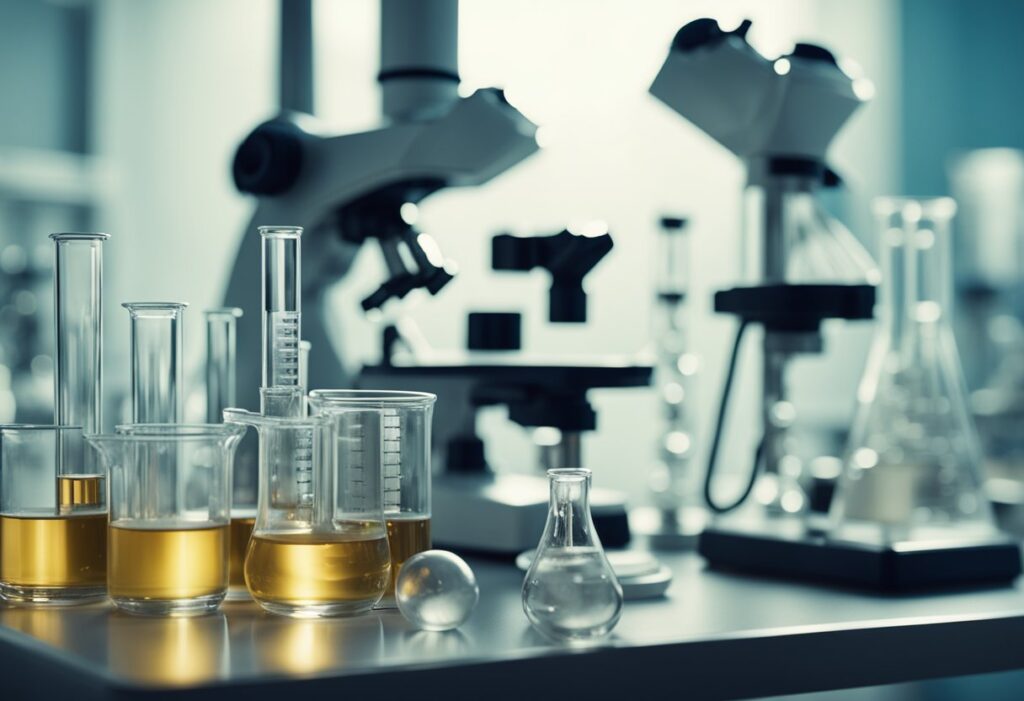Diindolylmethane, commonly known as DIM, is a compound your body synthesizes when you digest cruciferous vegetables like broccoli, brussels sprouts, and cabbage. It’s been gaining attention for its potential benefits in promoting prostate health, an important consideration for men as they age. Studies have suggested that DIM may influence hormone levels in men, and by doing so, it could play a role in maintaining a healthy prostate.

Understanding the connection between DIM and your prostate health is crucial because it might help manage the risks associated with prostate problems such as benign prostatic hyperplasia (BPH) and prostate cancer. These conditions are prevalent among men, especially as they get older, making the quest for preventive or therapeutic options a priority for many.
By incorporating cruciferous vegetables into your diet or considering a DIM supplement with the advice of a healthcare professional, you could potentially harness the properties of DIM to support your prostate health. Research has been exploring how this compound impacts hormonal balance and cellular health in the prostate, providing insights that men could use in pursuit of well-being.
Understanding Diindolylmethane and Its Sources

Diindolylmethane (DIM) is a nutrient that has stirred considerable interest for its presence in cruciferous vegetables and potential health benefits, specifically for prostate health. Understanding its sources, how your body processes it, and the optimal levels to include in your diet is essential.
Chemical Composition and Derivation from Cruciferous Vegetables
Diindolylmethane is a compound that your body creates from another substance called indole-3-carbinol (I3C), found in cruciferous vegetables such as broccoli, brussels sprouts, and cauliflower. These vegetables contain naturally occurring chemicals known as glucosinolates, which, when chopped or chewed, are broken down into biologically active compounds, including I3C. Upon ingestion, I3C is further converted to DIM in the liver. Notably, these vegetables are also rich in fiber, vitamins, and minerals, contributing to overall health.
- Brassica Vegetables Known for DIM:
- Broccoli
- Brussels sprouts
- Cabbage
- Cauliflower
Bioavailability and Metabolism
The bioavailability of DIM — that is, the extent and rate at which it is absorbed into your bloodstream — significantly depends on the metabolism of I3C in the liver. This process is crucial because it determines the amount of DIM that is available to your body’s tissues. Unique among dietary components, DIM undergoes a complex interaction with enzymes that may influence its bioactivity. However, the specifics of DIM bioavailability are not as well understood as those of many other nutrients.
DIM Levels and Dietary Considerations
The optimal levels of DIM in your diet are not explicitly established. However, consuming a diet rich in cruciferous vegetables can provide a source of DIM once the body has metabolized the available I3C. These vegetables should be a part of a balanced diet due to their nutrient richness. You might also hear about supplements, such as BR-DIM, that aim to deliver concentrated doses of bioavailable DIM, yet it’s important to approach these products with an understanding of the limited research on their absorption and effects on health compared to DIM obtained directly from vegetables.
The Role of Diindolylmethane in Prostate Health and Cancer Prevention
Diindolylmethane, also known as DIM, is a compound that your body makes from consuming cruciferous vegetables. Research suggests that DIM could have a protective effect against prostate cancer and may support overall prostate health. In the following sections, we’ll examine how DIM impacts prostate cancer risk, its clinical efficacy for prostate health, its hormonal interactions, and therapeutic implications, as well as potential side effects you should be aware of.
Impact on Prostate Cancer Risk and Cell Mechanisms
DIM has been noted for its ability to induce G1 cell cycle arrest and apoptosis in prostate cancer cells, which are crucial processes in inhibiting cell proliferation. Studies suggest that DIM may affect numerous molecular targets, including EZH2 and the let-7 family of microRNAs, which play roles in cancer stem cell signatures. Research also indicates that it could assist in DNA damage response, promoting the overall health of your prostate cells.
Efficacy in Prostate Health: Clinical Studies and Evidence
Initial clinical studies point to DIM having a chemopreventive effect for conditions like prostatic intraepithelial neoplasia, often considered a precursor to prostate cancer. Clinical trials, including a phase I dose-escalation study, have been investigating the optimal dose that could offer effectiveness in cancer prevention. It is also being studied for its potential to lower PSA levels, which are markers used to track prostate health.
Interactions with Hormones and Receptors
DIM is a bioactive indole that may modulate your hormones, acting as an anti-androgen. It has been observed to inhibit the androgen receptor, potentially reducing the growth-promoting effects of testosterone on prostate cancer cells. In addition, DIM might influence estrogen levels by moderating the activity of an enzyme called aromatase. This hormonal interaction is a key area of interest concerning your prostate health.
Nutritional and Therapeutic Implications of Diindolylmethane Supplementation
Supplementing with DIM is considered due to its anticancer properties and role in cancer prevention, which could cover various types such as breast, lung, colorectal, ovarian, and colon cancer. Nutrient sources include cruciferous vegetables or concentrated supplements. Isoflavone consumption from soy is also related to DIM levels in your body, which could have synergistic effects for protection against human cancer risk.
Potential Side Effects and Considerations
While DIM is a promising therapeutic agent, assessing safety and toxicity is vital. Potential side effects may include headache, gas, and digestive issues like nausea, vomiting, and diarrhea. High doses could potentially lead to undesired weight loss or hormonal imbalances. It’s important to consult with your doctor before starting any supplementation, especially if you’re undergoing treatment for conditions like PMS or menopause or taking other medications.
Conclusion
Diindolylmethane (DIM), a compound found in cruciferous vegetables, has potential health benefits, especially related to prostate health. When considering DIM supplementation, it’s crucial to discuss this with your doctor, particularly if you are already on medication, as DIM can influence drug metabolism.
Side effects are relatively uncommon, but may include headache, gas, nausea, vomiting, or diarrhea. In terms of safety, DIM is generally considered safe when consumed in the amounts typically found in food. However, when taken in high doses, the risk of toxicity and adverse effects increases.
When exploring natural approaches to manage conditions like PMS or symptoms of menopause, DIM may offer benefits due to its influence on estrogens. Although it is not directly associated with weight loss, maintaining a healthy weight may impart additional benefits for prostate health.
In summary, while DIM shows promise, ensure you have a healthcare professional guiding your use. This approach will help maximize the efficacy of DIM while minimizing potential side effects.
Frequently Asked Questions
In this section, you will find targeted information regarding diindolylmethane (DIM) and its impact on men’s prostate health, clear guidelines for supplementation, and insights into hormonal effects and potential side effects.
What are the benefits of DIM supplementation for men’s prostate health?
DIM supplementation may offer prostate protection by promoting ‘good’ estrogen metabolites and decreasing ‘bad’ ones, which can positively influence prostate health.
Who may be at risk or contraindicated for taking diindolylmethane supplements?
Individuals with hormone-sensitive conditions, those on certain medications, or those undergoing hormone therapy may be at risk or contraindicated for taking DIM supplements and should consult with a healthcare provider.
What is the recommended dosage of DIM for managing estrogen dominance?
To manage estrogen dominance, the recommended dosage of DIM is typically around 100 mg to 200 mg per day, but it’s vital to follow a healthcare provider’s advice for individual needs.
How does DIM affect hormonal activities like 5-alpha-reductase in the body?
DIM is thought to moderate hormonal activities, and it may support healthier estrogen metabolism and could influence enzymes such as 5-alpha-reductase that synthesize androgens.
Are there any side effects associated with diindolylmethane that can affect urinary health?
While generally considered safe, DIM can cause some side effects related to urinary health, such as changes in urine color; high doses may increase the risk of side effects.